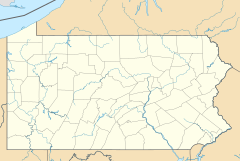Allegheny Mountain (Pennsylvania)
| Allegheny Mountain | |
|---|---|
| Allegheny Ridge[1] | |
 Allegheny Mountain Tunnel on the Pennsylvania Turnpike | |
| Highest point | |
| Peak | Grandview Summit (Eastern Continental Divide) |
| Elevation | 3,010.3 ft (917.5 m) [2]:a |
| Coordinates | 40°3′29″N 78°45′29″W / 40.05806°N 78.75806°W / 40.05806; -78.75806Coordinates: 40°3′29″N 78°45′29″W / 40.05806°N 78.75806°W / 40.05806; -78.75806 |
| Geography | |
 Allegheny Mountain Allegheny Mountain is a northern portion of the range of Allegheny Mountains | |
| Country | United States |
| State | Pennsylvania |
| Counties | Bedford, Cambria and Somerset |
| Parent range | Ridge-and-Valley Appalachians of the Allegheny Mountains |
| Geology | |
| Orogeny | Alleghenian orogeny |
| Type of rock | Carboniferous[3] |
 Eastern Continental Divide points of Allegheny Mountain (Pennsylvania) | |
Allegheny Mountain is a stratigraphic ridge that extends northeast to southwest from south of Blue Knob (Pennsylvania)[specify] to a saddle point at the Savage Mountain anticline. It merges with Negro Mountain just north of the Cambria County line where the Berlin-Salisbury basin expires [1].
Eastern Continental Divide (ECD)- The ECD enters Allegheny Mountain south of Fraziers Pass and follows the Allegheny Backbone [2] southwest where it leaves the escarpment toward the saddle point to the southeast between headwaters of Flaugherty and Wills Creeks, at which the ECD enters the Savage Mountain anticline.[3]
| wikiarticle | west valley | summit or other point | east valley |
|---|---|---|---|
| Northern terminus | [specify] | ||
| Fraziers Pass[clarification needed] | 2,180 feet (660 m) (Stonycreek River) | 3,010.3 feet (917.5 m)40°3′29″N 78°45′29″W / 40.05806°N 78.75806°W / 40.05806; -78.75806 (Grandview Summit) | 1,100 feet (340 m) (Juniata River) |
US Route 30 | 2,580 feet (790 m) (Breastwork Run) | ||
| summit | 2,801 feet (854 m)[verification needed]39°58′38″N 78°50′16″W / 39.97722°N 78.83778°W / 39.97722; -78.83778 (summit) | ||
| summit | 2,795 feet (852 m)[verification needed]39°57′48″N 78°50′50″W / 39.96333°N 78.84722°W / 39.96333; -78.84722 (summit) | ||
Pennsylvania Turnpike | 2,220 feet (680 m) (Stonycreek River) | 2,690 feet (820 m)39°57′41″N 78°51′24″W / 39.96139°N 78.85667°W / 39.96139; -78.85667 (summit) Allegheny Mountain Tunnel | |
Chambersburg and Pittsburgh Survey[4] | 2,580 feet (790 m)39°57′13″N 78°50′32″W / 39.95361°N 78.84222°W / 39.95361; -78.84222 (Deeter Gap) | ||
Raystown Branch Juniata River | Buffalo Creek | 2,889.6 feet (880.8 m)39°54′48″N 78°53′16″W / 39.91333°N 78.88778°W / 39.91333; -78.88778 (triple watershed) | 1,260 feet (380 m) (Little Wills Creek) |
| Savage Mountain PA[5] | 2,667 feet (813 m)39°53′11″N 78°44′10″W / 39.88639°N 78.73611°W / 39.88639; -78.73611[6] | ||
Allegheny Backbone | 2,830 feet (860 m)39°49′25″N 78°58′10″W / 39.82361°N 78.96944°W / 39.82361; -78.96944 (summit) southmost ECD summit on Allegheny Mountain (Pennsylvania) escarpment | ||
Baltimore & Ohio Railroad | 1,940 feet (590 m) Casselman River @ Flaugherty Creek | 2,430 feet (740 m)39°48′30″N 78°57′27″W / 39.80833°N 78.95750°W / 39.80833; -78.95750[5] (saddle point) | 900 feet (270 m) Wills Creek @ Little Wills Creek |
References
^ DeFebo, Michael. "Improving the Roadway Turnpike Considers Tunnel Options". PATurnpike.com. Archived from the original on 2011-09-28. Retrieved 2009-11-28..mw-parser-output cite.citation{font-style:inherit}.mw-parser-output q{quotes:"""""""'""'"}.mw-parser-output code.cs1-code{color:inherit;background:inherit;border:inherit;padding:inherit}.mw-parser-output .cs1-lock-free a{background:url("//upload.wikimedia.org/wikipedia/commons/thumb/6/65/Lock-green.svg/9px-Lock-green.svg.png")no-repeat;background-position:right .1em center}.mw-parser-output .cs1-lock-limited a,.mw-parser-output .cs1-lock-registration a{background:url("//upload.wikimedia.org/wikipedia/commons/thumb/d/d6/Lock-gray-alt-2.svg/9px-Lock-gray-alt-2.svg.png")no-repeat;background-position:right .1em center}.mw-parser-output .cs1-lock-subscription a{background:url("//upload.wikimedia.org/wikipedia/commons/thumb/a/aa/Lock-red-alt-2.svg/9px-Lock-red-alt-2.svg.png")no-repeat;background-position:right .1em center}.mw-parser-output .cs1-subscription,.mw-parser-output .cs1-registration{color:#555}.mw-parser-output .cs1-subscription span,.mw-parser-output .cs1-registration span{border-bottom:1px dotted;cursor:help}.mw-parser-output .cs1-hidden-error{display:none;font-size:100%}.mw-parser-output .cs1-visible-error{font-size:100%}.mw-parser-output .cs1-subscription,.mw-parser-output .cs1-registration,.mw-parser-output .cs1-format{font-size:95%}.mw-parser-output .cs1-kern-left,.mw-parser-output .cs1-kern-wl-left{padding-left:0.2em}.mw-parser-output .cs1-kern-right,.mw-parser-output .cs1-kern-wl-right{padding-right:0.2em}
^ "GISDATA Map Studio". United States Geological Survey. Retrieved 2009-12-09.
a. "USGS Elevation Web Service Query". Retrieved 2009-12-03.
[permanent dead link]: 1) Y_Value=40.058056&X_Value=-78.758056 ... 3010.25951315412
b. quadrangle maps, 1:24,000, 7.5-Minute Series (Topographic): 1) Berlin, Pennsylvania, 2) Cumberland, Maryland-Pennsylvania-West Virginia
^ Stevenson, J. J (1882). The Geology of Bedford and Fulton Counties. Second Geological Survey of Pennsylvania: Report of Progress Volume 2. Board of Commissioners for the Second Geological Survey. Retrieved 2009-12-06.
^ Hage, Hother (1839). Report of Hother Hage Chambersburg and Pittsburgh Survey. Simmons-Boardman Publishing Corporation. p. 113. Retrieved 2009-12-04.
^ ab Google Maps, Maps.Google.com|access-date=requires|url=(help)
Savage Mountain (PA),
Sand Patch Tunnel,
Little Savage Mountain
^ "Mountain Peaks and Summit Names". MountainPeaks.net. Retrieved 2009-11-29.
Savage Mountain PA